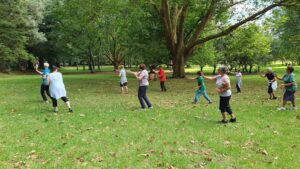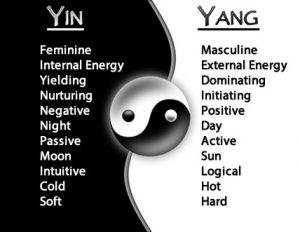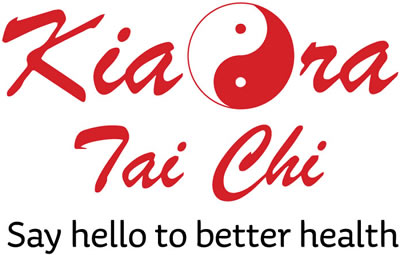by Jocelyn Watkin | Mar 8, 2022 | Information |

Free tai chi and qigong with me every Sunday morning (9am) and Tuesday evening (6pm) in Cornwall Park until Tuesday 29 March 2022. Weather dependent and you’ll need to bring your “My Vaccine Pass”.
Ideal for beginners of all ages and abilities, particularly those seeking a calming and nurturing exercise experience that is also effective for fitness and balance.
The linked postures and steps of tai chi, along with deep, meditative breathing (called qigong), are designed to improve your overall health and can also strengthen leg and core muscles.
Tai chi and qigong are good for your body as well as your mind and are helpful at reducing stress.
The 45-minute sessions in Cornwall Park are free, fun and suitable for all ages and abilities, especially beginners. Feel free to invite family, friends and colleagues to join in. The sessions are outside and there’s a whole park for us to spread out in.
To attend these classes, everyone will need to present their My Vaccine Pass on arrival and scan the Cornwall Park QR code. Masks are encouraged while you interact with me or other participants at the start, but are not required during the class as physical distancing will be in place. If you feel more comfortable wearing a mask for the whole time, I support your decision.
Summer Tai Chi in the Park sessions are covered by Cornwall Park’s health and safety requirements, including their conditions of entry. I have been hired by the park’s management to provide these classes as part of their official programme of events.
Here is all of the information you need:
- Where are the sessions? In Cornwall Park about halfway up Pōhutukawa Drive and under the trees to the left of the road. (Same place as previous years).
- Directions for those who haven’t attended before: Drive, cycle or walk into Cornwall Park from Greenlane Road West. That entry road is called Pōhutukawa Drive. My tai chi sessions will be about halfway up Pōhutukawa Drive on the left hand side and under the trees. Look for me and my instructors in our red Kia Ora Tai Chi shirts. If you get to the roundabout you’ve gone past us. Refer to the park’s visitor information website for a park map: Cornwall Park visitor info
- Days and times: Sunday mornings at 9am (we’ll be there from 8.45am) and Tuesday evenings at 6pm (we’ll be there from 5.45pm).
- How long are the sessions? 45 minutes
- What to bring: your My Vaccine Pass, a mask, water bottle, a sun hat/sun block and wear comfy clothing and footwear.
- If rainy or when there are high winds: Look for the cancellation notice on the Kia Ora Tai Chi Facebook page: www.facebook.com/kiaorataichi/ or text me on 027 493 9851. Or you can check with the park’s visitor centre (the Huia Lodge Discovery Hub, open 7 days from 10am – 4pm) https://cornwallpark.co.nz/contact
- What happens if Omicron numbers get higher? The tai chi sessions can take place at all current red, orange and green ‘traffic light settings’. Changes may be required with the tai chi sessions if the settings are changed by the government. Updates will be available on the Cornwall Park website or on the Kia Ora Tai Chi facebook page: www.facebook.com/kiaorataichi/
- More information: https://cornwallpark.co.nz/whats-on/tai-chi-2
I would so love to see you under those lovely shady trees in the park. I will teach a number of exciting and different tai chi and qigong forms as the sessions progress and until the last one on Tuesday 29 March.
Find out more
by Jocelyn Watkin | Sep 15, 2021 | Information |

Jocelyn teaches you from her online tai chi studio
Wouldn’t it be awesome if you could learn tai chi from me without having to leave home? Totally awesome and don’t just dream about it.
Vaccination for Covid-19 is not required as this course is completed online in your own space.
My new online course, called “Tai Chi for Strength, Balance and Mobility”, has received an enthusiastic thumbs up from participants who ‘test drove’ it.
It is now available so you can learn from me at any time that suits you, 24 hours per day, 7 days per week and anywhere you have computer, tablet or mobile phone.
If you want to live stronger for longer with better strength, balance and mobility, please enroll using this link: https://navigatinghealthcare.co.nz/programs/#Tai-Chi-for-Strength-Balance-Mobility
This course has six modules, each designed to be comfortably completed within one week. However, you can take longer if you like. There are easy-to-read articles and how-to videos where I show you the movements step-by-step and share the secrets of tai chi. It will be like I am right there in your home with you.
I am a qualified, premier instructor for the Tai Chi for Health Institute. Find out why I can help you learn tai chi that is safe, easy-to-learn and effective: https://www.kiaorataichi.nz/about-us/
The course is ideal for anyone who:
- is worried about their balance or who wants to help a family member or friend to improve their balance.
- wants to get fitter and stronger.
- needs something that truly helps to manage and reduce stress.
- would love a good night’s sleep.
- is curious about tai chi and how it works for strength, balance and mobility.
- is an instructor teaching tai chi for fall prevention or strength & balance classes
One participant said of the course: “The special breathing I learned has helped me de-stress and calm down. It feels like a weight off my chest and shoulders”.
Can you imagine how blissful it would be to fall into a deep slumber almost as soon as your head hits the pillow? During this course, you’ll learn calming meditative breathing that you can use anywhere and anytime you feel stressed or worried, especially just before you go to bed. Click here if you’re looking for sweet dreams
Wouldn’t it be a relief to help a friend or family member improve their balance so you no longer worry about them having a fall and getting hurt? It sure would. Click here to help that special someone to stand tall and with good balance.
How amazing would it be if you could live stronger for longer? Totally! You’ll have access to the videos and articles for at least six months so you can regularly practice and build more strength and balance. Click here if you want to become more mobile and for years longer.
Sabine, a qualified Tai Chi for Health instructor recommends this course: Thank you Jocelyn, for a very enjoyable course. I loved the step-by-step approach and I could feel the improvement of my core strength, breathing and posture. Safety was top priority through the whole course and it was achieved with very clear and easy instructions. Overall, a wonderful experience.
All this and more with my new Tai Chi for Strength, Balance and Mobility course… and you won’t have to go out on a wintry wet night to learn it. You can participate in the privacy and warmth of your own home.
For just $99 you’ll receive:
- The full online course of six sessions, with supporting articles and how-to learning videos, which are delivered to your email inbox once per week.
- Additional resources of a practice journal and checklist.
- Access to a client portal where you can ask questions and share experiences each week.
If you want to live stronger for longer with better strength, balance and mobility, please enroll using this link: https://navigatinghealthcare.co.nz/programs/#Tai-Chi-for-Strength-Balance-Mobility
by Jocelyn Watkin | Jul 8, 2021 | Information |
 An out-of-this-world mini retreat at the Stardome to learn how to relieve stress, sleep better and create a calm and centred new life with tai chi and qigong.
An out-of-this-world mini retreat at the Stardome to learn how to relieve stress, sleep better and create a calm and centred new life with tai chi and qigong.
Date and time: Friday 25 March 2022, 1.30 – 7.45pm.
Venue: Stardome Observatory & Planetarium (This retreat is organised by Kia Ora Tai Chi, not the Stardome itself.)
Address: 670 Manukau Road, One Tree Hill Domain, Royal Oak, Auckland. Refer to map
A “My Vaccine Pass” will be required by everyone attending.
Join Kia Ora Tai Chi during the time of the Autumn Equinox in March, when the length of a day shortens to become equal to that of night, and the earth is harmonised. Perfect timing to rest and reflect.
Stress management
Can you imagine how good it would feel to escape from the black hole of stress from too many demands at work or from life in general? Absolutely, positively YES. At this mini retreat, through the booster rocket that is tai chi and deep oxygen-rich breathing (called qigong), you’ll learn how to avoid the gravitational force of stress. After the retreat, you’ll know how to rebalance your mind and body at anytime you feel stressed, wherever you are.
Work/life balance
How fantastic would it be to navigate into a new orbit where you had time and energy for everything you want to do? Let the countdown begin to blast off to a new and balanced universe for you. You’ll learn how to use a space journal to calm and focus your mind so you can get more out of life, enjoy ‘me time’ and shine bright and warm like a sun in your own solar system.
Better sleep

Wouldn’t it be fabulous to enjoy a feeling of weightlessness and without worry as you fall into a delectable, deep slumber every night? Imagine a full night’s sleep without tossing and turning or your brain churning about everything you need to do? Don’t just daydream about it. Through guided tai chi meditation you will learn how to empty your mind and say good night to stress and anxiety so you can wake up refreshed and ready for anything, every morning.
Testimonial: “Thank you so much for your lovely tai chi classes The feeling I get is of empowerment and understanding of how we can use our body to help in our daily life.” (Caroline, January 2020)
Mindfulness
How fulfilling would it be to feel mindful and connected, instead of a lone star adrift in a starless night? Infinitely satisfying. We’ll take you on a live 360-degree experience at the planetarium with an extraordinary tour of the stars, planets, constellations and our night sky. After the retreat, you’ll be able to look up on any night and feel that you and your amazing world are calm, balanced and in harmony with the entire universe.
Buy a ticket to this out-of-this world mini-retreat at the Stardome (numbers limited to 12 people) You will need to be doubly vaccinated to attend this event.
- $189 per person using PayPal or a credit card (plus credit card fees, if applicable). Please click on the “Buy Now” button below. You do not need a PayPal account to pay by credit card as you can sign in/check out as a guest.
- Bring a friend or family member for half price (94.50). Contact Kia Ora Tai Chi to arrange the ‘bring a friend’ ticket once you’ve bought one ticket for $189 (using the “Buy Now” button above).
- For online banking (without a credit card), buy a full price ticket (@ $189) with or without a ‘bring a friend ticket” (@ $94.50), click here to contact Jocelyn Watkin of Kia Ora Tai Chi or phone/text her on: 027 493 9851.
Please note: we do not offer refunds. However, if you cancel before 5th November 2021 we will credit your payment (less any credit card fees) towards another Kia Ora Tai Chi event or set of classes. If you cancel on the 5th November 2021 or later, you will lose any payments you have already made.
Who is the instructor?
Jocelyn Watkin helps people of all ages and abilities to reduce stress and improve their overall health, fitness and balance with tai chi and qigong.
She is the founder and director of Kia Ora Tai Chi and is a qualified, premier instructor for the international Tai Chi for Health Institute. She has extensive experience in teaching face-to-face or online for regular weekly classes, workshops and retreats, at schools, a medical centre and a retirement village.
Jocelyn has a New Zealand Diploma of Teaching and has trained in martial arts for over 25 years, specialising solely in tai chi and qigong since 2003.
What is the Autumn Equinox and why is it so important for the mini retreat?
 In Aotearoa/New Zealand, the Autumn Equinox for 2022 happens during mid – late March. It is when the number of daylight hours equal that of the night hours. e.g. Day and night are balanced perfectly. What this means for all living things (including us humans), is that after the energy of the long, hot summer we can now enjoy cooler days. We are getting ready to nourish our minds and bodies with the fruits of the autumn harvest and to prepare ourselves for winter.
In Aotearoa/New Zealand, the Autumn Equinox for 2022 happens during mid – late March. It is when the number of daylight hours equal that of the night hours. e.g. Day and night are balanced perfectly. What this means for all living things (including us humans), is that after the energy of the long, hot summer we can now enjoy cooler days. We are getting ready to nourish our minds and bodies with the fruits of the autumn harvest and to prepare ourselves for winter.
It is the perfect time for reflection and to learn how to become more balanced and stress-free.
Who is this mini retreat for?
It will be ideal for anyone aged 18+ who wants to bust stress, sleep better or is seeking life/work balance. High school students needing help with anxiety or wanting a way to reduce stress during the school year can attend for half price if accompanied by a full price adult.
All abilities are welcome as the tai chi and qigong can be done seated or standing.
Testimonial: “Jocelyn [of Kia Ora Tai Chi] makes tai chi such an enjoyable experience! She makes everyone feel welcome, no matter what age or level of experience. I love Jocelyn’s humour and her patience too. Tai chi has helped me focus on my breathing and posture. I feel invigorated after each session.” (Cynthia, February 2020)
What’s included in the mini retreat?
- You will learn Tai Chi for Meditation, Harmony and Balance, which is powerful yet gentle on your joints. After the retreat, you’ll be able to do this tai chi at anytime to reduce stress.
- Journaling to calm and focus your mind so you get more out of life.
- The countdown method to mindfulness. Easy to remember whenever you need it.
- A journal that you can take home and keep using after the retreat.
- A live 360-degree experience at the planetarium.
- Tea, coffee and snacks.
- Free parking at the Stardome and in One Tree Hill Domain.
- Meeting new friends

What others say about Kia Ora Tai Chi sessions:
“Calming”, “Keeps the body moving”, “Inspiring”, “Encouraging”, “Feel centred”, “Sleep better”, “Feel in control”, “Wonderful”, “Fabulous”, “Loved it” and “A gift”.
Buy a ticket to this out-of-this world mini-retreat at the Stardome (numbers limited to 12 people) You will need to be doubly vaccinated to attend this event.
- $189 per person using PayPal or a credit card (plus credit card fees, if applicable). Please click on the “Buy Now” button below. You do not need a PayPal account to pay by credit card as you can sign in/check out as a guest.
- Bring a friend or family member for half price (94.50). Contact Kia Ora Tai Chi to arrange the ‘bring a friend’ ticket once you’ve bought one ticket for $189 (using the “Buy Now” button above).
- For online banking (without a credit card), buy a full price ticket (@ $189) with or without a ‘bring a friend ticket” (@ $94.50), click here to contact Jocelyn Watkin of Kia Ora Tai Chi or phone/text her on: 027 493 9851.
Please note: we do not offer refunds. However, if you cancel before 1st March 2022 we will credit your payment (less any credit card fees) towards another Kia Ora Tai Chi event or set of classes. If you cancel on the 1st March 2022 or later, you will lose any payments you have already made.
What is tai chi and qigong and why are they so good for you?
Often described as “moving meditation”, tai chi is an ancient Chinese martial art and exercise programme that combines mental focus with deliberate, mindful steps and postures. It is sometimes referred to as “taiji” or “tai chi chuan”.

The kaupapa (underlying principle) of tai chi is Yin & Yang. These are two opposite and contrary forces in nature, which become interconnected and interdependent. An example would be night turning to day, followed by day turning to night. They work together in harmony and one can’t exist without the other.
Tai chi uses the natural balance of Yin & Yang in all movements. E.g. where there is forward step, there is also a backward one. If you move to one side, then you will also move to the other. In doing so, your body remains equally balanced as it smoothly moves from one step to the next, which doesn’t stress your joints.
Tai chi also works in harmony with your sympathetic nervous system (the fight, flight or freeze reflex). If you’re feeling tired or down, tai chi will boost and lift you. If you’re upset or anxious, it will help you to become calmer and more tranquil.
Qigong (pronounced ‘chee – gong’) is a deep breathing exercise. It is designed to calm your mind, rejuvenate your energy and increase your oxygen flow right down to your smallest fingers and toes. It will warm your hands and feet and will help you to feel good all over your body. Find out more
Numerous clinical trials have confirmed that tai chi taught specifically for health, which also includes deep breathing (the qigong) will improve your overall health and fitness by:
-
-
- Decreasing stress.
- Improving balance.
- Increasing strength, fitness and flexibility.
- Better breathing (more oxygen in your body).
- Decreasing pain in your joints.
- Helping to reduce high blood pressure.
- Increasing your sense of well-being.
What is journaling?
 Writing in a journal (also known as journaling) can help you to process and understand what is happening in your life.
Writing in a journal (also known as journaling) can help you to process and understand what is happening in your life.
It will assist you to develop a plan of action to reduce worry, anxiety and stress and to take back the control of your thoughts and your life.
It can help you to overcome the overwhelm and create new habits to lasting change and freedom.
Jocelyn learned about the power of journaling when recovering from post traumatic stress over 20 years ago.
What will I need to bring?
-
-
- Pen and paper or your lap top to take notes.
- A water bottle
- Something you’d like to eat during a short dinner break.
- Comfortable shoes to wear for tai chi (you can also do tai chi in bare feet).
- Tai chi can be done in almost any clothing, but you are also welcome to bring a set of comfy clothes to change into if you are coming straight from work.
Why is the retreat on a Friday afternoon and evening and not a weekend?
A vital part of what you will learn at the mini-retreat is how to make time for the activities you most want to do and for the people you love. Scheduling the retreat on what is traditionally a work day is a perfect first step for you to arrange time off for something worthwhile. You would make time for health care, as in a doctor or dental appointment, so why not for Tai Chi for Health? With a 1.30pm start time, those working will only need a half-day of leave.
What is the cancellation policy?
We do not offer refunds. However, if you cancel before 1st March 2022 we will credit your payment (less any credit card fees) towards another Kia Ora Tai Chi event or set of classes. If you cancel on the 1st March 2022 or later, you will lose any payments you have already made.
On the 1st March we will need to confirm and pay for the meeting room at the Stardome. To do this, we need a minimum number of committed people.
If for any reason we need to cancel the retreat before 25th March (for example, if there is another lockdown) you will be refunded in full. If you have any questions, please contact Jocelyn Watkin of Kia Ora Tai Chi.
What is your COVID-19 policy?
Jocelyn has been doubly vaccinated for Covid-19. All participants in this mini retreat will need to provide proof that they are also doubly vaccinated against Covid-19 (i.e. With a “My Vaccine Pass”). All surfaces will be cleaned prior to the retreat and hand sanitiser will be provided. We will abide by the NZ Government’s health advice and regulations.
Attendance numbers are limited to 12 people.
“Remember to look up at the stars and not down at your feet.
Try to make sense of what you see and wonder about what makes the universe exist. Be curious.
And however difficult life may seem, there is always something you can do and succeed at.
It matters that you don’t just give up.” – Professor Stephen Hawking

by Jocelyn Watkin | Jun 15, 2021 | Information |

Join in with the Kia Ora Tai Chi team for a free tai chi and qigong session to celebrate Matariki and the wonderful Māori New Year.
Have fun, breathe better and make new friends with 5-Element Qigong, which is a meditative breathing programme to harmonise your mind and body. This is a great chance for a new and healthier you for the New Year.
You will also learn the beautiful and flowing Hikitia te Hā (“uplifting breathing”, also known as Māori Tai Chi).
Ideal for beginners of all ages and abilities. The whole session can easily be done while standing, seated or a mixture of both.
When: Saturday 3 July 2021, 2 – 3pm, please arrive from 1.45pm onward
Where: The theatre building, Nathan Homestead, 70 Hill Road, Manurewa, Auckland. There is plenty of free parking at this venue, which is close to the motorway. Refer to this map
RSVP: Yes please, as places are limited to just 16 people. Please email or text/phone me: 027 493 9851 to reserve your spot. (Note: there is a limit of two people per booking)
Cost: Free (A big thank you to Nathan Homestead and Auckland Council for providing the venue at no charge).
Click here to learn more about tai chi and qigong
Matariki is the Māori name for the cluster of stars also known as the Pleiades. It rises in midwinter and is the start of a new year in the Southern Hemisphere.
In 2021, Matariki will be observed Aotearoa/New Zealand between 19 June to 11 July.
More about Matariki
Find out more about the Kia Ora Tai Chi team.
by Jocelyn Watkin | Jun 7, 2021 | Information |

Jocelyn teaches you from her online tai chi studio
Wouldn’t it be awesome if you could learn tai chi from me without having to leave home? Totally awesome and now you can do more than just dream about it.
My new online course, called “Tai Chi for Strength, Balance and Mobility”, has received an enthusiastic thumbs up from ‘guinea pigs’ who ‘test drove’ it.
It is now available for all of you so you can learn at any time that suits you, 24 hours per day, 7 days per week and anywhere you have computer, tablet or mobile phone.
This course has six modules, each designed to be comfortably completed within one week. However, you can take longer if you like. There are easy-to-read articles and how-to videos where I show you the movements step-by-step and share the secrets of tai chi. It will be like I am right there in your home with you.
I am a qualified, premier instructor for the Tai Chi for Health Institute. Find out why I can help you learn tai chi that is safe, easy-to-learn and effective: https://www.kiaorataichi.nz/about-us/
The course is ideal for anyone who:
- is worried about their balance or who wants to help a family member or friend to improve their balance.
- wants to get fitter and stronger.
- needs a helping hand to manage and reduce stress.
- would love a good night’s sleep.
- is curious about tai chi and how it works for strength, balance and mobility.
- is an instructor teaching tai chi for fall prevention or strength & balance classes
One participant said of the course: “The special breathing I learned has helped me de-stress and calm down. It feels like a weight off my chest and shoulders”.
Can you imagine how blissful it would be to fall into a deep slumber almost as soon as your head hits the pillow? During this course, you’ll learn calming meditative breathing that you can use anywhere and anytime you feel stressed or worried, especially just before you go to bed. Click here if you’re looking for sweet dreams
Wouldn’t it be a relief to help a friend or family member improve their balance so you no longer worry about them having a fall and getting hurt? It sure would. Click here to help that special someone to stand tall and with good balance.
How amazing would it be if you could live stronger for longer? Totally! You’ll have access to the videos and articles for at least six months so you can regularly practice and build more strength and balance. Click here if you want to become more mobile and for years longer.
Sabine, a qualified Tai Chi for Health instructor recommends this course: Thank you Jocelyn, for a very enjoyable course. I loved the step-by-step approach and I could feel the improvement of my core strength, breathing and posture. Safety was top priority through the whole course and it was achieved with very clear and easy instructions. Overall, a wonderful experience.
All this and more with my new Tai Chi for Strength, Balance and Mobility course… and you won’t have to go out on a wintry wet night to learn it. You can participate in the privacy and warmth of your own home.
For just $99 you’ll receive:
- The full online course of six sessions, with supporting articles and how-to learning videos, which are delivered to your email inbox once per week.
- Additional resources of a practice journal and checklist.
- Access to a client portal where you can ask questions and share experiences each week.
If you want to live stronger for longer with better strength, balance and mobility, please enroll using this link: https://navigatinghealthcare.co.nz/programs/#Tai-Chi-for-Strength-Balance-Mobility



 An out-of-this-world mini retreat at the Stardome to learn how to relieve stress, sleep better and create a calm and centred new life with tai chi and qigong.
An out-of-this-world mini retreat at the Stardome to learn how to relieve stress, sleep better and create a calm and centred new life with tai chi and qigong.
 In Aotearoa/New Zealand, the Autumn Equinox for 2022 happens during mid – late March. It is when the number of daylight hours equal that of the night hours. e.g. Day and night are balanced perfectly. What this means for all living things (including us humans), is that after the energy of the long, hot summer we can now enjoy cooler days. We are getting ready to nourish our minds and bodies with the fruits of the autumn harvest and to prepare ourselves for winter.
In Aotearoa/New Zealand, the Autumn Equinox for 2022 happens during mid – late March. It is when the number of daylight hours equal that of the night hours. e.g. Day and night are balanced perfectly. What this means for all living things (including us humans), is that after the energy of the long, hot summer we can now enjoy cooler days. We are getting ready to nourish our minds and bodies with the fruits of the autumn harvest and to prepare ourselves for winter.

 Writing in a journal (also known as journaling) can help you to process and understand what is happening in your life.
Writing in a journal (also known as journaling) can help you to process and understand what is happening in your life.
